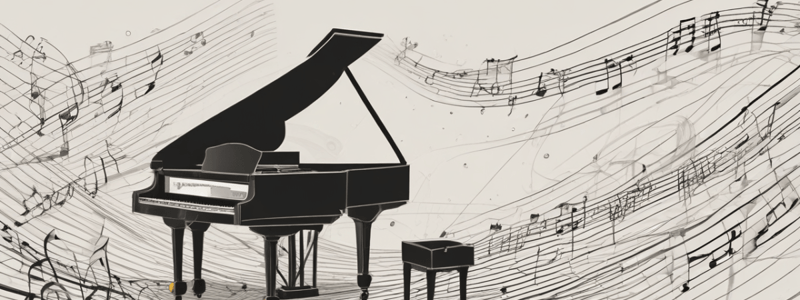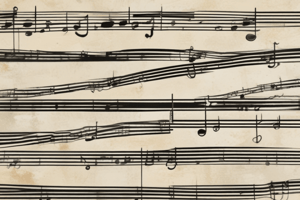Podcast
Questions and Answers
What is the benefit of building a broad musical vocabulary?
What is the benefit of building a broad musical vocabulary?
- To appreciate different music genres
- To learn to play an instrument
- To enhance your melodic dictation skills (correct)
- To improve your understanding of music theory
What is the purpose of practicing with real-life examples in melodic dictation?
What is the purpose of practicing with real-life examples in melodic dictation?
- To learn to play an instrument
- To practice singing
- To improve your ability to transcribe melodies with greater ease and accuracy (correct)
- To learn music theory
What is the benefit of seeking feedback and collaboration in melodic dictation?
What is the benefit of seeking feedback and collaboration in melodic dictation?
- To practice singing
- To learn music theory
- To improve your advanced melodic dictation skills (correct)
- To learn to play an instrument
What is Harmonic Ear Training?
What is Harmonic Ear Training?
What is a prerequisite for Harmonic Ear Training?
What is a prerequisite for Harmonic Ear Training?
What is a benefit of developing Harmonic Ear Training skills?
What is a benefit of developing Harmonic Ear Training skills?
What is an aspect of Harmonic Ear Training?
What is an aspect of Harmonic Ear Training?
What is the purpose of analyzing chord progressions in Harmonic Ear Training?
What is the purpose of analyzing chord progressions in Harmonic Ear Training?
What is the ultimate goal of developing Harmonic Ear Training skills?
What is the ultimate goal of developing Harmonic Ear Training skills?
What is the primary focus of advanced melodic dictation skills?
What is the primary focus of advanced melodic dictation skills?
What should you analyze before attempting to transcribe a melody?
What should you analyze before attempting to transcribe a melody?
What is the recommended approach for beginners in Harmonic Ear Training?
What is the recommended approach for beginners in Harmonic Ear Training?
What can help you develop a sense of timing in transcribing complex melodies?
What can help you develop a sense of timing in transcribing complex melodies?
Why is understanding the underlying harmonic structure of a melody important?
Why is understanding the underlying harmonic structure of a melody important?
What adds depth and character to a melody?
What adds depth and character to a melody?
What is involved in transcribing polyphonic melodies?
What is involved in transcribing polyphonic melodies?
What should you start with when transcribing polyphonic melodies?
What should you start with when transcribing polyphonic melodies?
What is the result of developing advanced melodic dictation skills?
What is the result of developing advanced melodic dictation skills?
What is the primary purpose of harmonic ear training?
What is the primary purpose of harmonic ear training?
What is a result of developing a strong sense of pitch?
What is a result of developing a strong sense of pitch?
What is enhanced by diving into harmonic ear training?
What is enhanced by diving into harmonic ear training?
What is a benefit of cultivating harmonic ear training?
What is a benefit of cultivating harmonic ear training?
What is a result of developing harmonic ear training?
What is a result of developing harmonic ear training?
What is a skill that harmonic ear training helps to develop?
What is a skill that harmonic ear training helps to develop?
What is a benefit of harmonic ear training for singers and instrumentalists?
What is a benefit of harmonic ear training for singers and instrumentalists?
What is the ultimate goal of dedicating time and effort to harmonic ear training?
What is the ultimate goal of dedicating time and effort to harmonic ear training?
What is a crucial skill for any musician aiming to improve their musical abilities?
What is a crucial skill for any musician aiming to improve their musical abilities?
What is one of the primary advantages of harmonic ear training?
What is one of the primary advantages of harmonic ear training?
What is the focus of chord recognition exercises?
What is the focus of chord recognition exercises?
How can harmonic ear training benefit music producers?
How can harmonic ear training benefit music producers?
What is the outcome of regularly practicing harmonic ear training?
What is the outcome of regularly practicing harmonic ear training?
What is the significance of harmonic ear training in improvisation?
What is the significance of harmonic ear training in improvisation?
What is the outcome of developing harmonic ear training skills?
What is the outcome of developing harmonic ear training skills?
What is the purpose of transcribing music by ear?
What is the purpose of transcribing music by ear?
Why is playing by ear a skill coveted by many musicians?
Why is playing by ear a skill coveted by many musicians?
What is the purpose of incorporating harmonic ear training into daily routine?
What is the purpose of incorporating harmonic ear training into daily routine?
Study Notes
Advanced Melodic Dictation Skills
- Analyzing Melodic Structure:
- Before transcribing a melody, analyze its structure by paying attention to ascending and descending patterns, larger melodic intervals, and repetitive motifs or phrases.
- Notating Rhythmic Patterns:
- Practice notating rhythmic patterns using a metronome or a drum machine to develop a sense of timing and improve accuracy in transcribing complex melodies.
- Recognizing Chord Progressions:
- Understanding the underlying harmonic structure of a melody can assist in its accurate dictation by identifying common chord progressions and training the ear to recognize them.
- Identifying Ornamentation and Embellishments:
- Focus on identifying trills, turns, grace notes, and slides to enhance the ability to accurately capture the overall melodic shape.
- Transcribing Polyphonic Melodies:
- Develop the ability to distinguish individual melodic lines and transcribe them separately, starting with two-part harmonies and progressing to more complex compositions.
- Expanding Musical Vocabulary:
- Build a broad musical vocabulary by actively listening to a wide range of music genres and studying the melodies of various composers to recognize different melodic styles and patterns.
- Practicing with Real-Life Examples:
- Practice transcribing melodies from real-life examples, such as recordings, live performances, or singing along to songs, to develop advanced melodic dictation skills.
- Seeking Feedback and Collaboration:
- Share transcriptions with fellow musicians or mentors and engage in musical collaborations to accelerate progress and challenge listening skills.
Harmonic Ear Training
- Ear Training Basics:
- Acquire a solid foundation in basic ear training skills, including recognizing individual notes, intervals, melodies, and rhythms, before progressing to harmonic training.
- What is Harmonic Ear Training?:
- Harmonic Ear Training focuses on understanding chords, chord progressions, and harmonic structures in music.
- Benefits of Harmonic Ear Training:
- Developing harmonic ear training skills enhances the ability to accurately transcribe music, improves improvisational skills, and enriches overall musicianship.
- Recognizing Chord Qualities:
- Identify and differentiate various chord qualities, including major, minor, augmented, and diminished chords, and their inversions.
- Analyzing Chord Progressions:
- Analyze and identify common chord progressions, including chord extensions and alterations, to anticipate and predict the next chord in a piece of music.
- Practicing Harmonic Ear Training:
- Regularly listen to music, focusing on harmonic elements, and try to identify chord qualities and progressions.
- Ear Training Exercises:
- Utilize exercises, such as chord recognition, chord progression identification, and harmonic dictation, to improve harmonic ear training skills.
Importance of Harmonic Ear Training
- Enhancing Musical Perception:
- Harmonic ear training amplifies musical perception, allowing for a deeper understanding and appreciation of the harmonic elements within a composition.
- Improving Music Production and Composition:
- Harmonic ear training enables music producers and composers to create compelling chord progressions and harmonies, resulting in more engaging and impactful music.
- Facilitating Improvisation Skills:
- Harmonic ear training indispensable for improvisation, as it enables musicians to spontaneously create melodies and harmonies that fit within the existing musical context.
- Enhancing Playing by Ear:
- Harmonic ear training forms the foundation for playing by ear, allowing musicians to learn and play music without relying on sheet music or notation.
- Developing a Strong Sense of Pitch:
- Harmonic ear training contributes to the development of a strong sense of pitch, aiding in achieving precise intonation and pitch accuracy.
- Enhancing Music Theory Knowledge:
- Harmonic ear training bolsters understanding of music theory concepts, expanding musical repertoire.
- Cultivating Musical Confidence:
- Harmonic ear training instills confidence in musical abilities, motivating musicians to take on more challenging tasks and explore new musical genres.
Studying That Suits You
Use AI to generate personalized quizzes and flashcards to suit your learning preferences.
Description
Develop advanced melodic dictation skills by mastering techniques beyond basic note recognition. This tutorial covers analyzing melodic structure, ascending and descending patterns, and more.




